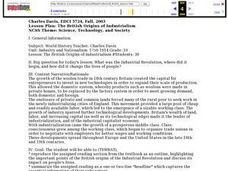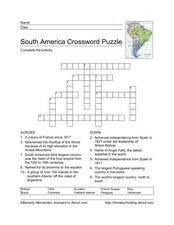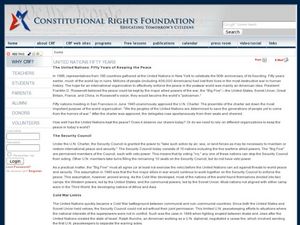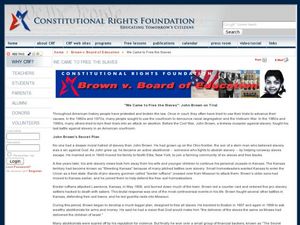Curated OER
The Importance of Being Flexible and Open-minded as a Visitor to Another Culture: Lesson 2 For "The Train Ride Home"
Learners examine the advantages of being flexible when visiting or living in a different culture. They read and discuss a first-hand account by a Peace Corps volunteer in Kazakhstan, and write a letter from the point of view of a...
Curated OER
Counting On Freedom
Students examine the poem and artistic masterpiece The Quadroon Girl and use this knowledge to practice mathematical concepts such as: more than, less than, counting, and majority.
Curated OER
FBI Counts Mosques
Students research the term "racial profiling to help decide if this directive fits in that category. Students explore the reaction of each side and the pros and cons each offers. Students Prepare a debate with one side supporting the FBI...
Curated OER
The British Origins of Industrialism
Tenth graders brainstorm the Industrial Revolution and how it changed the lives of people. They describe rural life in preindustrial Britain. They identify the factors that allowed Britian to become the first industrialized nations.
Curated OER
Flag Day Challenge
In this Flag Day worksheet, learners read 8 clues pertaining to Flag Day. From four choices, students choose the answer that best matches each clue.
Curated OER
Many Teenagers Uninformed in Financial Literacy
Young scholars explore the concept of financial literacy. They read an article about the lack of financial literacy among teenagers, discuss what if means to be financially literate, the research a career that will allow them to live...
Curated OER
Sleuthing A Writer's Skills
Learners read The Train Ride Home by Robin Solomon. In this literature response lesson, students will inspect the writing of Solomon to determine how she established a certain tone through her word choice and paragraph structure....
Curated OER
English Vocabulary Skills: AWL Sublist 7 - Exercise 6b
In this online interactive English vocabulary skills worksheet, high schoolers answer 10 matching questions which require them to fill in the blanks in 10 sentences. Students may submit their answers to be scored.
Curated OER
The United Nations: Fifty Years of Keeping the Peace
Students examine the work of the United Nations. For this United Nations lesson, students listen to their instructor present a lecture regarding the history of the United Nations. Students respond to discussion questions pertaining to...
Curated OER
"We Came to Free the Slaves": John Brown on Trial
Students explore the plight of John Brown to fight slavery. In this Brown vs. Board of Education lesson, students listen to a lecture regarding Brown's work to free slaves through rebellion. Students participate in classroom discussion...
Curated OER
The Adarand Case: Affirmative Action and Equal Protection
Eleventh graders examine the Adarand case. In this American Government lesson, 11th graders create a list of reasons for each affirmative action program. Students develop a defense on certain issues and present it to the class.
Curated OER
South Koreans in the Vietnam War
Young scholars consider why South Koreans fought in the Vietnam War. In this Vietnam War lesson, high schoolers engage in an activity through which they investigate why South Koreans fought in the Vietnam War and how their participation...
Curated OER
The Coming of Independence
Provide your learners with an opportunity to show what they know. Have them answer 10 questions on colonial America, 13 Colonies, colonial legislature, and popular sovereignty. There are 5 true/false and 5 multiple choice questions.
Curated OER
South Africa
Have your class learn about South Africa and prepare for a discussion using this resource. Learners read a 3-page article about the nation and then note details about apartheid, Afrikaners, Nelson Mandela, and more on the provided...
Curated OER
Famous African Americans,
Studying African American history? Explore and discuss famous African Americans such as Martin Luther King Jr., George Washington Carver, Harriet Tubman, and more. Simple bulleted facts detail the heroic deeds of these individuals. Use...
The New York Times
The Cold War: Crossword
This crossword puzzle focuses on clues related to The Cold War. It also has unrelated clues that would be a challenge to middle schoolers, but should be manageable to secondary students; particularly juniors taking US history. There are...
Curated OER
World Religions
Ninth graders investigate the symbols and historical figures of the five main religions of the world. They participate in a class discussion, listen to a lecture and take notes, and write five Haikus, one about each major religion of...
The New York Times
A Worker's Compensation
Middle schoolers read about the history of Labor Day in a newspaper article. They discuss difficulties American employees of the past had to face, learn about labor rallies, and conduct Internet research. Part of the intention of this...
Curated OER
The Korean War
In this reading comprehension instructional activity, students read a passage about major events of the Korean War. Students then answer 7 fill in the blank and 7 true/false questions based on the reading.
Curated OER
Abolishing Slavery
Students explain the goals and methods of the abolitionist movement.
They identify key leaders in the movement. This lesson has adaptations for elementary through high school. Links are provided for resource readings.
Curated OER
Breaking News English: Turkey and EU
In this Turkey and EU worksheet, students read the article, answer true and false questions, complete synonym matching, complete phrase matching, complete a gap fill, answer short answer questions, answer discussion questions, write, and...
Curated OER
Working Where The Sun Never Shines
Students analyze documents of miners and identify their working conditions. In this industrial revolution instructional activity students view documents and photographs of miners and discuss their conditions and what some possible...
Curated OER
Auschwitz Episode Guide: Surprising Beginnings
Students examine how the Nazis came to power and living conditions at Auschwitz. They watch and discuss a PBS documentary, read and discuss handouts, analyze a Pyramid of Hate, and assign experiences in their own lives to different...


